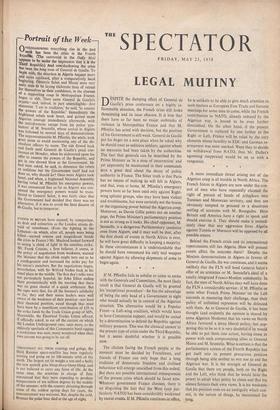—Portrait of the Week— O VERSHADOWING everything else in the past
week has been the crisis in the Fourth Republic. (The cartoonist in the Daily Mail aPpears to • be under the impression that it is the Thud Republic.) And overshadowing the crisis has been the long nose of General de Gaulle. To begin with, the situation in Algeria became more and more confused, after a comparatively lucid liegmning, Generals Salan and Massu were very early seen to be laying elaborate lines of retreat for themselves as their confidence, in the absence of a supporting coup in Metropolitan France, began to ebb. Then came General de Gaulle's exyptic—and, indeed, in pari unintelligible—first statement. 'I am in readiness,' he said, `to assume the powers of the Republic.' Immediately the frightened rebels took heart, and gained more Algerian courage immediately afterwards, with the melodramatic escape from his police 'pro- tectors' of M. Soustelle, whose arrival in Algiers was followed by several days of demonstrations. The unpronounceable M. Pflimlin, the while, took great pains to avoid mentioning any of the dis- obedient officers by name. The tide flowed back and forth until General de Gaulle's press con- ference on Monday, when he elaborated upon his offer to assume the powers of the Republic, and got in one shrewd blow at the Government. He had been asked, he said, to denounce the rebels as seditious but the Government itself had not done so, why should he? Once more Algiers took heart, and when, a frightened National Assembly having voted M. Pflimlin his emergency powers, it was announced that as'far as Algeria was con- cerned the emergency powers would be trans- ferred to General Satan, it was fairly clear that the Government had decided that there was no alternative, if it was to avoid the final disaster of de Gaulle, but to temporise.
EVENTS IN BRITAIN have seemed, by comparison, as drab and colourless as the London streets de- void of omnibuses. (Even the fighting in the Lebanon—in which, after all, people were being killed—seemed remote and insignificant beside the crisis in France.) Mr. Macleod looked forward to seeing 'a chink of light' in the omnibus strike; Mr. Frank Cousins, a firm believer, it seems, in the policy of negotiation from weakness, warned the Minister that the chink might turn out to be a conflagration and increased the strike pay for his union's members. But the negotiations began, nevertheless, with Sir Wilfred Neden back in his usual place in the middle. The first day's talks were not particularly hopeful, Sir John Elliot ending them pessimistically with the warning that there Was no great chance of a quick settlement. But the signs were that, for all the busmen's solidarity so far, they and their union leaders were well aware of the weakness of their position—not least their financial position, eased though that must have been by a munificent contribution of £10 to the strike funds by the Trade Union group of MPs. Meanwhile, the Electrical Trades Union offered, if officially asked, to cut off the current on which the London Underground runs; once more, as the unlovely spectacle of this Communist band rigging a conference was seen, many wondered when their own current was going to be cut off.
it
inamictiotrr ALL THESE comings and goings, the third Russian space-satellite has been regularly coming and going on its 106-minute orbit of the earth. The largest yet (it weighs a ton and a half), the new sputnik goes bleep-bleep-bleep-bleep, and is not believed to carry any form of life. At the same time, the scientists in charge of Zeta announced that they were expecting to produce temperatures of ten million degrees by the middle of the summer; with the country shivering through some of the coldest spring days for years, the announcement was welcome. But, despite the cold, Brumas the polar bear died at the age of eight.


































 Previous page
Previous page